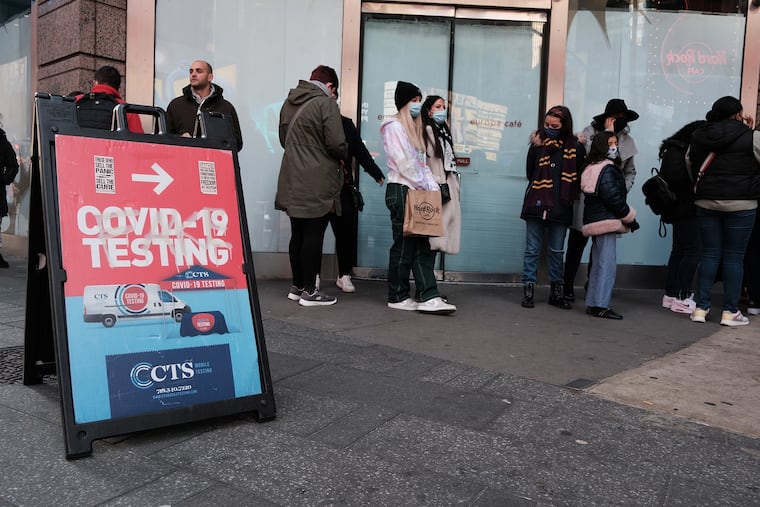These Penn doctors still urge immediate COVID-19 testing for some patients. Here’s why.
If our patient had waited until Monday to get evaluated and tested, he couldn't have received the most effective new drug to prevent COVID-19's worst effects in seniors and the immune-compromised.

It was late Friday afternoon when this patient message arrived:
“Doctor, I have had a fever and cough for the last three days. Can you send in something to the pharmacy, or should I set up a telemedicine visit for Monday?”
The patient is 70 years old and has diabetes, high blood pressure, and a compromised immune system from cancer treatment. He is fully vaccinated for COVID-19 and has received a booster dose, yet his primary care provider thought he could not wait until Monday to be evaluated.
Why?
We have entered a hopeful new phase of the pandemic. While COVID-19 remains a public health threat, case rates, hospitalizations, and deaths are decreasing. Vaccination has proven very successful in preventing the worst outcomes of COVID-19 infection. But concerns remain as new variants emerge, vaccination rates continue to lag, and many who have had the initial vaccine series are hesitant about boosters.
In addition, some patients who are chronically ill or immune-compromised may not respond as well to vaccination and can still become quite ill if infected. Misinformation about COVID’s origin, vaccination and treatments abound. And we are still learning about long-COVID, a protracted, disabling syndrome that may cause fatigue, breathing trouble, pain, and brain fog, and may affect even those with milder initial illness.
Fortunately, new treatments effective at preventing progression to more serious illness are now available for high risk, non-hospitalized patients such as those older than 65 or with chronic illnesses. However, these treatments must be started during the early stages of COVID-19 infection.
Current treatments for patients outside the hospital fall into two main categories: monoclonal antibodies, which bind to the surface proteins of the virus to help the immune system clear the virus away, and antiviral medications, which inhibit viral machinery to prevent the virus from effectively replicating. Some medications such as monoclonal antibodies and the antiviral drug remdesivir can be administered only by injection so have the added challenge of requiring travel to limited sites for administration.
In addition, viral mutations up to this point have tended to change the surface proteins of the virus, creating new variants that can evade many monoclonal antibodies. Although new monoclonal antibodies are being developed, it is an immunologic game of whack-a-mole to keep up against the new variants.
Another new medication, called nirmatrelvir-ritonavir (brand name Paxlovid), overcomes many of these treatment challenges. It can be taken by mouth, can be obtained from commercial retail pharmacies, and is currently effective against all of the new variants. It has been shown in scientific studies to reduce the risk of COVID-19 hospitalization or death by 89% compared with a placebo.
Here’s the caveat: You must get tested right away, as it must be started within five days of the onset of symptoms. No exceptions. If our patient had waited until Monday to get evaluated and tested, he would have been outside of the treatment window.
The supply of Paxlovid in pharmacies is significantly less than for most other prescription drugs, and not all pharmacies have it. Even so, the greatest access limit is the short window in which it can be prescribed. The Department of Health and Human Services has developed a therapeutic locator to help patients and providers identify pharmacies that have the medication, and in our health system we have developed a process to help with safe prescribing to avoid potential interactions between this powerful new therapy and some commonly used medicines.
However, none of these processes are effective unless patients are evaluated and tested quickly and the positive test result is available within five days of symptom onset. Our patient was able to receive the medication because of the early outreach and swift action by his health-care provider.
Now more than ever, it is essential to develop an individual COVID-19 plan, especially if you have a condition that puts you at higher risk for complications from COVID-19. If you develop symptoms, you should know where you can get tested and get results quickly, even late on a Friday afternoon. The most efficient way to get tested is a home rapid antigen test, including those that are available free from the federal government, so it is wise to keep kits on hand. This advanced planning and early evaluation will give you the best chance to receive information and support, limit contagion, and benefit from available treatments.
Jeffrey Millstein is a primary-care physician and medical director for patient experience-regional practices at Penn Medicine; Keith W. Hamilton is associate professor of clinical medicine in the Division of Infectious Diseases, Perelman School of Medicine at the University of Pennsylvania.